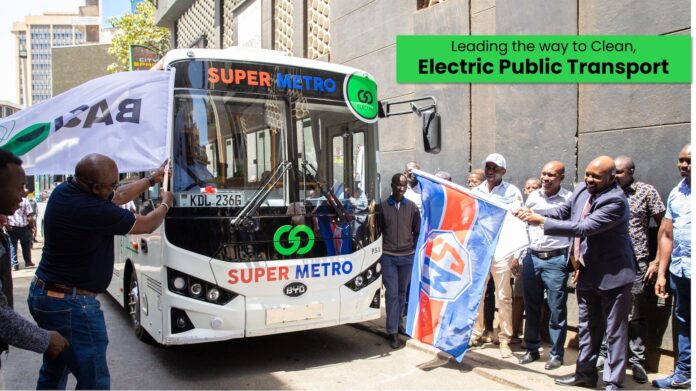As the world moves towards cleaner cheaper technology in the transport sector to heighten efficiency, safeguard lives and protect the environment, Kenya is taking part.
Players in the public transport sector are leading the pack in going green, with a number of electric buses already in operation.
The stakeholders say they’re ready and willing to transition to e-buses should the operating environment be made conducive for them.
E- mobility is the use of electricity to power transport infrastructure as an alternative to fossil fuels.
Even though developed countries such as China and the US are way ahead in this, Kenya is embracing the push to ditch engines powered using fossil fuels.
No one better understands the benefits of this transition than Nelson Mwangi, a matatu operator with over two decades of public transport experience.
Mwangi, who is also the Chairman of the Super Metro Sacco, said: “Biashara ya matatu kwangu mimi naeza sema ni mzuri, kwa sababu imetujenga, imetulisha, ime-elimisha watoto wetu, na tumefanya mengi na biashara ya matatu.”
Despite being a lucrative venture, their profits have been dwindling over time due to high running costs.
“The biggest challenge as we speak is the fuel increment, vile mafuta inaongezeka kila mwezi, inatuumiza juu inachukua ile faida kidogo yenye sisi huwa tunapata. Na haiwezi kuwa kila mwezi mafuta ikipanda tunaongeza nauli,” Mwangi said.
This situation has compelled them to switch to the green alternative of electric buses.
“Wakati mabasi za eletric zilianza kuingia Kenya, sisi kama Super Metro, ndio tulikuwa kampuni ya kwanza kununua, kwa sababu tuliona ya kwamba mafuta ikiongezwa labda tukipotelea kwa stima tunaeza kuwa tukisave pesa,” he said.
New as it may sound, this concept has seen a few e-buses plying different routes in the city, and operators say they make more economic sense.
“Unapata ya kwamba ya diesel inaezaweka kwa siku kitu kama Ksh.9,000, lakini ya electric inaezaweka kama Ksh.15,000, kwa hivyo kuna tofauti kubwa,” Mwangi added.
Drivers also say they’re experiencing a change while driving around, with Julius Omariba, one such e-bus driver, stating; “Hii hata siitani, watu wanajileta tuu hata ikijaa, wengine wananikasirikia lakini nitafanya aje, si imejaa tayari.”
For the passengers, comfort is one of the selling points with these electric buses, with Omariba aadding; “Watu wanaipenda sana, wazee wanasema kumbe tulikuwa tunagonjeka kwa kutingizwa tingizwa na kunukishwa diesel, na kelele, wanafurahi wanaomba ziwe mingi.”
According to Mwangi there are about 12 active electric PSV buses on city roads currently.
All these buses have been supplied by Basi Go, an e-mobility entity that’s at the forefront in helping Kenya’s public transport sector go green.
Moses Nderitu, the Chief Revenue Officer (CRO) at Basi Go, said: “The first step, what we are doing are city buses, this is where a majority of economic activities are happening around the city, so these busses can actually operate in the entire metropolitan area of the city because they’re able to do between 250 and 300 km a day.”
Matatu operators are able to acquire these buses through a financing model dubbed Pay As You Drive.
“It is a kilometre-based financing that enables you to acquire what is normally an expensive asset, and we get into a lease programme where you pay based on the mileage you drive everyday… included in that payment is charging, routine maintenance and safari checks,” added Nderitu.
But how much does one part with if they are to get one of these?
The Basi Go CR said: “The 25 seaters we were selling at Ksh.5.8 million with a Ksh.23 per km pay as you drive, but the bus we are moving forward with and which will be assembled locally that is 36 seater will go for Ksh.8 million if you are buying and Ksh.40 per km in pay as you drive or lease the bus at Ksh.70 per km.
Basi Go has already filled up its orders for 2024, with at least 250 e-buses having been pre-booked by various matatu operators.
The first locally assembled e-buses from Basi Go are expected to be launched in January.
Other than their economic benefits, comfort and silence, electric buses are also kinder to the environment due to their low carbon emissions.
In Kenya, the transport sector, particularly road transportation, is one of the main sources of climate-damaging CO2 emissions, due to the use of fossil fuels for vehicle propulsion systems.
A greater degree of electrification of the transport sector can therefore make a major contribution toward achieving Kenya’s transport sector goal of reducing emissions by 3.46 metric tonnes of CO2 emissions against the baseline in 2030.
And so e-mobility is proving to be a better and preferred option among matatu operators. even then a number of issues must be taken care of chief among them infrastructure.
“We only have two charging points, near the airport and in Kikuyu, so you can’t go far from the charging point. Also the range of the buses is under 400 km, it cant do the whole day without a recharge,” noted Mwangi.
At the moment players are relying broadly on Chinese technology due to its global position in this green transition.
In 2018 about 80,000 electric buses were delivered globally, 99 per cent of those were in delivered in china. In 2020, China accounted for 90 per cent of e-buses supplies in the world.
As the world rapidly shifts to electric mobility it’s the hope of many a stakeholder that Kenya will be quick to take the cue.





